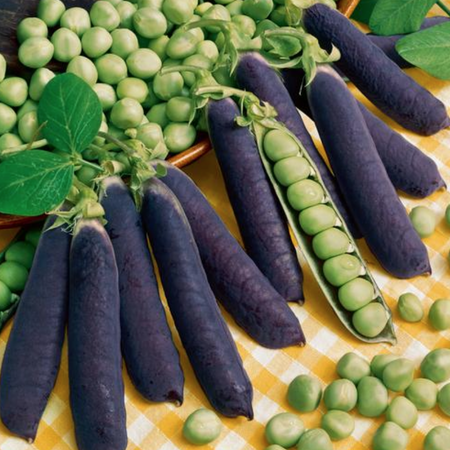Blue Shelling, Pea Seeds
Key Attributes
Key Attributes
Product Details
Weight
.08Plant Height
6'Botanical Name
Pisum sativumSeed Type
SeedAdditional Characteristics
Organic SeedsSeeds Per Gram
4Seeds Per Pound
2,000Row Spacing
12-18"Packet
250 Seeds (2 oz)Sow Depth
1"Seeds Per Ounce
125Breed
Open-pollinatedSun
Full Sun / Partial ShadeTypes
SHELLING PEASMaturity
Late SeasonGrowing Conditions
ContainerLife Cycle
AnnualSow Method
Direct SowPlant Spacing
1"Categories
PeaGermination
6,7,8,9,10Days To Maturity (# Days)
80Organic
OrganicHeirloom
HeirloomSeeds Per Acre
275 lbsComponents
Growing Instructions
Shipping Schedule
Our Seed Promise
 "Agriculture and seeds" provide the basis upon which our lives depend. We must protect this foundation as a safe and genetically stable source for future generations. For the benefit of all farmers, gardeners and consumers who want an alternative, we pledge that we do not knowingly buy or sell genetically engineered seeds or plants.
"Agriculture and seeds" provide the basis upon which our lives depend. We must protect this foundation as a safe and genetically stable source for future generations. For the benefit of all farmers, gardeners and consumers who want an alternative, we pledge that we do not knowingly buy or sell genetically engineered seeds or plants.
The mechanical transfer of genetic material outside of natural reproductive methods and between genera, families or kingdoms, poses great biological risks as well as economic, political, and cultural threats. We feel that genetically engineered varieties have been insufficiently tested prior to public release. More research and testing is necessary to further assess the potential risks of genetically engineered seeds. Further, we wish to support agricultural progress that leads to healthier soils, to genetically diverse agricultural ecosystems, and ultimately to healthy people and communities.
To learn more about the "Safe Seed Pledge" please visit www.councilforresponsiblegenetics.org.

